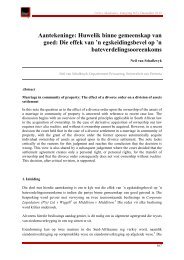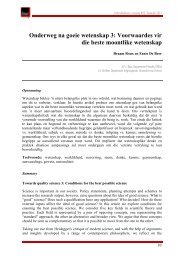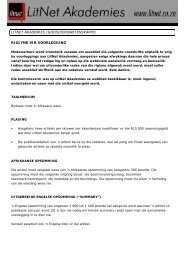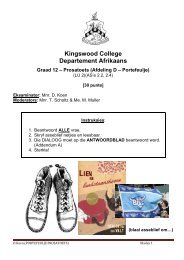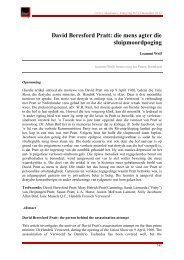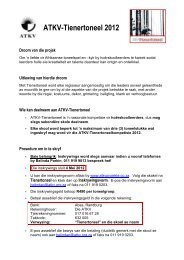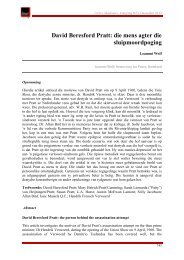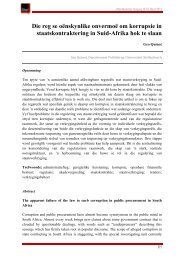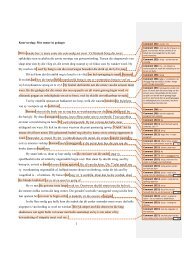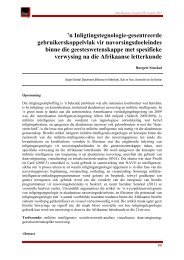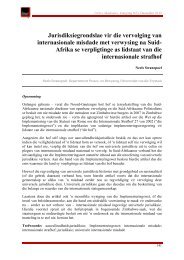- Page 1 and 2:
LitNet Akademies Augustus 2012: jaa
- Page 3 and 4:
Adviesraadslede van LitNet Akademie
- Page 5 and 6:
Inhoudsopgawe Afdeling: Natuurweten
- Page 7 and 8:
Die impak van revisie op vertaalde
- Page 9 and 10:
LitNet Akademies Jaargang 9 (2), Ap
- Page 11 and 12:
LitNet Akademies Jaargang 9 (2), Ap
- Page 13 and 14:
LitNet Akademies Jaargang 9 (2), Ap
- Page 15 and 16:
LitNet Akademies Jaargang 9 (2), Ap
- Page 17 and 18:
en die SOLVSOM S2 = (L2,S2), met L2
- Page 19 and 20:
Vlak 0 0 0 0 0 0 0 0 0 0 0 0 0 0 0
- Page 21 and 22:
LitNet Akademies Jaargang 9 (2), Ap
- Page 23 and 24:
LitNet Akademies Jaargang 9 (2), Ap
- Page 25 and 26:
LitNet Akademies Jaargang 9 (2), Ap
- Page 27 and 28:
LitNet Akademies Jaargang 9 (2), Ap
- Page 29 and 30:
Aanhangsel LitNet Akademies Jaargan
- Page 31 and 32:
LitNet Akademies Jaargang 9 (2), Ap
- Page 33 and 34:
LitNet Akademies Jaargang 9(2), Aug
- Page 35 and 36:
LitNet Akademies Jaargang 9(2), Aug
- Page 37 and 38:
LitNet Akademies Jaargang 9(2), Aug
- Page 39 and 40:
Figuur 2. Borrelbemiddelde elektros
- Page 41 and 42:
LitNet Akademies Jaargang 9(2), Aug
- Page 43 and 44:
3. Resultate en bespreking LitNet A
- Page 45 and 46:
LitNet Akademies Jaargang 9(2), Aug
- Page 47 and 48:
LitNet Akademies Jaargang 9(2), Aug
- Page 49 and 50:
LitNet Akademies Jaargang 9(2), Aug
- Page 51 and 52:
Abstract Epigenetics: The link betw
- Page 53 and 54:
LitNet Akademies Jaargang 9(2), Aug
- Page 55 and 56:
LitNet Akademies Jaargang 9(2), Aug
- Page 57 and 58:
2. Tipes epigenetiese modifikasies
- Page 59 and 60:
LitNet Akademies Jaargang 9(2), Aug
- Page 61 and 62:
LitNet Akademies Jaargang 9(2), Aug
- Page 63 and 64:
LitNet Akademies Jaargang 9(2), Aug
- Page 65 and 66:
LitNet Akademies Jaargang 9(2), Aug
- Page 67 and 68:
LitNet Akademies Jaargang 9(2), Aug
- Page 69 and 70:
Vetsug Veranderde geenuitdrukking v
- Page 71 and 72:
ensieme gevolg deur PCR (MSRE-PCR)
- Page 73 and 74:
LitNet Akademies Jaargang 9(2), Aug
- Page 75 and 76:
LitNet Akademies Jaargang 9(2), Aug
- Page 77 and 78:
LitNet Akademies Jaargang 9(2), Aug
- Page 79 and 80:
LitNet Akademies Jaargang 9(2), Aug
- Page 81 and 82:
Afdeling: Regte
- Page 83 and 84:
LitNet Akademies Jaargang 9(2), Aug
- Page 85 and 86:
1. Inleiding LitNet Akademies Jaarg
- Page 87 and 88:
LitNet Akademies Jaargang 9(2), Aug
- Page 89 and 90:
LitNet Akademies Jaargang 9(2), Aug
- Page 91 and 92:
4.2. F-sake 4.2.1 Feite LitNet Akad
- Page 93 and 94:
4.2.3. Uitspraak van die konstitusi
- Page 95 and 96:
LitNet Akademies Jaargang 9(2), Aug
- Page 97 and 98:
LitNet Akademies Jaargang 9(2), Aug
- Page 99 and 100:
LitNet Akademies Jaargang 9(2), Aug
- Page 101 and 102:
10 962-3. LitNet Akademies Jaargang
- Page 103 and 104:
LitNet Akademies Jaargang 9(2), Aug
- Page 105 and 106:
64 443. 65 2011:142. LitNet Akademi
- Page 107 and 108:
93 F v Minister of Safety and Secur
- Page 109 and 110:
Opsomming LitNet Akademies Jaargang
- Page 111 and 112:
LitNet Akademies Jaargang 9(2), Aug
- Page 113 and 114:
LitNet Akademies Jaargang 9(2), Aug
- Page 115 and 116:
4. Dogmatiese grondslag LitNet Akad
- Page 117 and 118:
5. Samevatting LitNet Akademies Jaa
- Page 119 and 120:
LitNet Akademies Jaargang 9(2), Aug
- Page 121 and 122:
LitNet Akademies Jaargang 9(2), Aug
- Page 123 and 124:
43 Sien O’Donovan (2000:79-81); B
- Page 125 and 126:
62 2003:690-1; sien ook Neethling,
- Page 127 and 128:
1. Inleiding en tersaaklike wetgewi
- Page 129 and 130:
3. Uitspraak en redes van die hof b
- Page 131 and 132:
LitNet Akademies Jaargang 9(2), Aug
- Page 133 and 134:
5. Bespreking 5.1 Die ondersteunend
- Page 135 and 136:
LitNet Akademies Jaargang 9(2), Aug
- Page 137 and 138:
LitNet Akademies Jaargang 9(2), Aug
- Page 139 and 140:
Eindnotas 1 Sien bv. De Jager v Gru
- Page 141 and 142:
38 Par. 13-7. 39 1967 4 SA 459 (A).
- Page 143 and 144:
LitNet Akademies Jaargang 9(2), Aug
- Page 145 and 146:
Burial wishes LitNet Akademies Jaar
- Page 147 and 148:
2. Die betekenis van die term begra
- Page 149 and 150:
LitNet Akademies Jaargang 9(2), Aug
- Page 151 and 152:
LitNet Akademies Jaargang 9(2), Aug
- Page 153 and 154:
LitNet Akademies Jaargang 9(2), Aug
- Page 155 and 156:
LitNet Akademies Jaargang 9(2), Aug
- Page 157 and 158:
LitNet Akademies Jaargang 9(2), Aug
- Page 159 and 160:
LitNet Akademies Jaargang 9(2), Aug
- Page 161 and 162:
LitNet Akademies Jaargang 9(2), Aug
- Page 163 and 164:
LitNet Akademies Jaargang 9(2), Aug
- Page 165 and 166:
5.2.1 Geskrewe instruksies LitNet A
- Page 167 and 168:
LitNet Akademies Jaargang 9(2), Aug
- Page 169 and 170:
LitNet Akademies Jaargang 9(2), Aug
- Page 171 and 172:
LitNet Akademies Jaargang 9(2), Aug
- Page 173 and 174:
13 Joubert e.a. (2009:6). LitNet Ak
- Page 175 and 176:
LitNet Akademies Jaargang 9(2), Aug
- Page 177 and 178:
LitNet Akademies Jaargang 9(2), Aug
- Page 179 and 180:
LitNet Akademies Jaargang 9(2), Aug
- Page 181 and 182:
153 Trollip-saak 247. Sien ook Jans
- Page 183 and 184:
LitNet Akademies Jaargang 9(2), Aug
- Page 185 and 186:
LitNet Akademies Jaargang 9(2), Aug
- Page 187 and 188:
LitNet Akademies Jaargang 9(2), Aug
- Page 189 and 190:
LitNet Akademies Jaargang 9(2), Aug
- Page 191 and 192:
LitNet Akademies Jaargang 9(2), Aug
- Page 193 and 194:
LitNet Akademies Jaargang 9(2), Aug
- Page 195 and 196:
LitNet Akademies Jaargang 9(2), Aug
- Page 197 and 198:
LitNet Akademies Jaargang 9(2), Aug
- Page 199 and 200:
LitNet Akademies Jaargang 9(2), Aug
- Page 201 and 202:
LitNet Akademies Jaargang 9(2), Aug
- Page 203 and 204:
LitNet Akademies Jaargang 9(2), Aug
- Page 205 and 206:
LitNet Akademies Jaargang 9(2), Aug
- Page 207 and 208:
19 Mbembe (2006:2). 20 Mbembe (2006
- Page 209 and 210:
LitNet Akademies Jaargang 9(2), Aug
- Page 211 and 212:
LitNet Akademies Jaargang 9(2), Aug
- Page 213 and 214:
1. Inleiding LitNet Akademies Jaarg
- Page 215 and 216:
LitNet Akademies Jaargang 9(2), Aug
- Page 217 and 218:
LitNet Akademies Jaargang 9(2), Aug
- Page 219 and 220:
LitNet Akademies Jaargang 9(2), Aug
- Page 221 and 222:
LitNet Akademies Jaargang 9(2), Aug
- Page 223 and 224:
LitNet Akademies Jaargang 9(2), Aug
- Page 225 and 226:
LitNet Akademies Jaargang 9(2), Aug
- Page 227 and 228:
LitNet Akademies Jaargang 9(2), Aug
- Page 229 and 230:
LitNet Akademies Jaargang 9(2), Aug
- Page 231 and 232:
LitNet Akademies Jaargang 9(2), Aug
- Page 233 and 234:
66 71 van 2008 art. 1: "Persoon: oo
- Page 235 and 236:
112 Davis et al. 2010:241. 113 71 v
- Page 237 and 238:
154 71 van 2008. 155 71 van 2008 ar
- Page 239 and 240:
LitNet Akademies Jaargang 9(2), Aug
- Page 241 and 242:
3. Die bestuursbenaderings LitNet A
- Page 243 and 244:
LitNet Akademies Jaargang 9(2), Aug
- Page 245 and 246:
LitNet Akademies Jaargang 9(2), Aug
- Page 247 and 248:
LitNet Akademies Jaargang 9(2), Aug
- Page 249 and 250:
LitNet Akademies Jaargang 9(2), Aug
- Page 251 and 252:
LitNet Akademies Jaargang 9(2), Aug
- Page 253 and 254:
8. Gevolgtrekking en samevatting Li
- Page 255 and 256:
LitNet Akademies Jaargang 9(2), Aug
- Page 257 and 258:
9 Kloppers 1999:430. 10 Bradstreet
- Page 259 and 260:
LitNet Akademies Jaargang 9(2), Aug
- Page 261 and 262:
89 71 van 2008 art. 140(1)(a). 90 7
- Page 263 and 264:
131 Kloppers 1999:430. 132 71 van 2
- Page 265 and 266:
Opsomming LitNet Akademies Jaargang
- Page 267 and 268:
LitNet Akademies Jaargang 9(2), Aug
- Page 269 and 270:
LitNet Akademies Jaargang 9(2), Aug
- Page 271 and 272:
LitNet Akademies Jaargang 9(2), Aug
- Page 273 and 274:
LitNet Akademies Jaargang 9(2), Aug
- Page 275 and 276:
LitNet Akademies Jaargang 9(2), Aug
- Page 277 and 278:
LitNet Akademies Jaargang 9(2), Aug
- Page 279 and 280:
LitNet Akademies Jaargang 9(2), Aug
- Page 281 and 282:
LitNet Akademies Jaargang 9(2), Aug
- Page 283 and 284:
LitNet Akademies Jaargang 9(2), Aug
- Page 285 and 286:
LitNet Akademies Jaargang 9(2), Aug
- Page 287 and 288:
LitNet Akademies Jaargang 9(2), Aug
- Page 289 and 290:
LitNet Akademies Jaargang 9(2), Aug
- Page 291 and 292:
LitNet Akademies Jaargang 9(2), Aug
- Page 293 and 294:
LitNet Akademies Jaargang 9(2), Aug
- Page 295 and 296:
LitNet Akademies Jaargang 9(2), Aug
- Page 297 and 298:
LitNet Akademies Jaargang 9(2), Aug
- Page 299 and 300:
LitNet Akademies Jaargang 9(2), Aug
- Page 301 and 302:
90 Grondwet artt. 7(2) en 8(1). 91
- Page 303 and 304:
LitNet Akademies Jaargang 9(2), Aug
- Page 305 and 306:
LitNet Akademies Jaargang 9(2), Aug
- Page 307 and 308:
5.2 Vereistes vir kennisgewing van
- Page 309 and 310:
LitNet Akademies Jaargang 9(2), Aug
- Page 311 and 312:
LitNet Akademies Jaargang 9(2), Aug
- Page 313 and 314:
LitNet Akademies Jaargang 9(2), Aug
- Page 315 and 316:
5 Sien art. 8; Otto en Otto (2010,
- Page 317 and 318:
LitNet Akademies Jaargang 9(2), Aug
- Page 319 and 320:
93 Par. 14 (my kursivering). LitNet
- Page 321 and 322:
Opsomming LitNet Akademies Jaargang
- Page 323 and 324:
LitNet Akademies Jaargang 9(2), Aug
- Page 325 and 326:
LitNet Akademies Jaargang 9(2), Aug
- Page 327 and 328:
LitNet Akademies Jaargang 9(2), Aug
- Page 329 and 330:
LitNet Akademies Jaargang 9(2), Aug
- Page 331 and 332:
LitNet Akademies Jaargang 9(2), Aug
- Page 333 and 334:
Universiteit van die Witwatersrand
- Page 335 and 336:
LitNet Akademies Jaargang 9(2), Aug
- Page 337 and 338:
LitNet Akademies Jaargang 9(2), Aug
- Page 339 and 340:
11. Gevolgtrekking LitNet Akademies
- Page 341 and 342:
LitNet Akademies Jaargang 9(2), Aug
- Page 343 and 344:
LitNet Akademies Jaargang 9(2), Aug
- Page 345 and 346:
LitNet Akademies Jaargang 9(2), Aug
- Page 347 and 348:
LitNet Akademies Jaargang 9(2), Aug
- Page 349 and 350:
LitNet Akademies Jaargang 9(2), Aug
- Page 351 and 352:
LitNet Akademies Jaargang 9(2), Aug
- Page 353 and 354:
LitNet Akademies Jaargang 9(2), Aug
- Page 355 and 356:
LitNet Akademies Jaargang 9(2), Aug
- Page 357 and 358:
LitNet Akademies Jaargang 9(2), Aug
- Page 359 and 360:
LitNet Akademies Jaargang 9(2), Aug
- Page 361 and 362:
LitNet Akademies Jaargang 9(2), Aug
- Page 363 and 364:
LitNet Akademies Jaargang 9(2), Aug
- Page 365 and 366:
LitNet Akademies Jaargang 9(2), Aug
- Page 367 and 368:
LitNet Akademies Jaargang 9(2), Aug
- Page 369 and 370:
LitNet Akademies Jaargang 9(2), Aug
- Page 371 and 372:
LitNet Akademies Jaargang 9(2), Aug
- Page 373 and 374:
LitNet Akademies Jaargang 9(2), Aug
- Page 375 and 376:
LitNet Akademies Jaargang 9(2), Aug
- Page 377 and 378:
LitNet Akademies Jaargang 9(2), Aug
- Page 379 and 380:
LitNet Akademies Jaargang 9(2), Aug
- Page 381 and 382:
LitNet Akademies Jaargang 9(2), Aug
- Page 383 and 384:
LitNet Akademies Jaargang 9(2), Aug
- Page 385 and 386:
LitNet Akademies Jaargang 9(2), Aug
- Page 387 and 388:
LitNet Akademies Jaargang 9(2), Aug
- Page 389 and 390:
LitNet Akademies Jaargang 9(2), Aug
- Page 391 and 392:
LitNet Akademies Jaargang 9(2), Aug
- Page 393 and 394:
LitNet Akademies Jaargang 9(2), Aug
- Page 395 and 396:
LitNet Akademies Jaargang 9(2), Aug
- Page 397 and 398:
LitNet Akademies Jaargang 9(2), Aug
- Page 399 and 400:
LitNet Akademies Jaargang 9(2), Aug
- Page 401 and 402:
LitNet Akademies Jaargang 9(2), Aug
- Page 403 and 404:
LitNet Akademies Jaargang 9(2), Aug
- Page 405 and 406:
LitNet Akademies Jaargang 9(2), Aug
- Page 407 and 408:
LitNet Akademies Jaargang 9(2), Aug
- Page 409 and 410:
LitNet Akademies Jaargang 9(2), Aug
- Page 411 and 412:
LitNet Akademies Jaargang 9(2), Aug
- Page 413 and 414:
LitNet Akademies Jaargang 9(2), Aug
- Page 415 and 416:
LitNet Akademies Jaargang 9(2), Aug
- Page 417 and 418:
liggaam be-leef, oor my liggaam so
- Page 419 and 420:
LitNet Akademies Jaargang 9(2), Aug
- Page 421 and 422:
LitNet Akademies Jaargang 9(2), Aug
- Page 423 and 424:
LitNet Akademies Jaargang 9(2), Aug
- Page 425 and 426:
LitNet Akademies Jaargang 9(2), Aug
- Page 427 and 428:
LitNet Akademies Jaargang 9(2), Aug
- Page 429 and 430:
Opsomming LitNet Akademies Jaargang
- Page 431 and 432:
LitNet Akademies Jaargang 9(2), Aug
- Page 433 and 434:
LitNet Akademies Jaargang 9(2), Aug
- Page 435 and 436:
LitNet Akademies Jaargang 9(2), Aug
- Page 437 and 438:
LitNet Akademies Jaargang 9(2), Aug
- Page 439 and 440:
LitNet Akademies Jaargang 9(2), Aug
- Page 441 and 442:
LitNet Akademies Jaargang 9(2), Aug
- Page 443 and 444:
LitNet Akademies Jaargang 9(2), Aug
- Page 445 and 446:
LitNet Akademies Jaargang 9(2), Aug
- Page 447 and 448:
LitNet Akademies Jaargang 9(2), Aug
- Page 449 and 450:
LitNet Akademies Jaargang 9(2), Aug
- Page 451 and 452:
LitNet Akademies Jaargang 9(2), Aug
- Page 453 and 454:
LitNet Akademies Jaargang 9(2), Aug
- Page 455 and 456:
LitNet Akademies Jaargang 9(2), Aug
- Page 457 and 458:
LitNet Akademies Jaargang 9(2), Aug
- Page 459 and 460:
LitNet Akademies Jaargang 9(2), Aug
- Page 461 and 462:
LitNet Akademies Jaargang 9(2), Aug
- Page 463 and 464:
LitNet Akademies Jaargang 9(2), Aug
- Page 465 and 466:
4.2 Wat is kuns? Wat is die funksie
- Page 467 and 468:
LitNet Akademies Jaargang 9(2), Aug
- Page 469 and 470:
LitNet Akademies Jaargang 9(2), Aug
- Page 471 and 472:
LitNet Akademies Jaargang 9(2), Aug
- Page 473 and 474:
LitNet Akademies Jaargang 9(2), Aug
- Page 475 and 476:
LitNet Akademies Jaargang 9(2), Aug
- Page 477 and 478:
LitNet Akademies Jaargang 9(2), Aug
- Page 479 and 480:
LitNet Akademies Jaargang 9(2), Aug
- Page 481 and 482:
LitNet Akademies Jaargang 9(2), Aug
- Page 483 and 484:
LitNet Akademies Jaargang 9(2), Aug
- Page 485 and 486:
LitNet Akademies Jaargang 9(2), Aug
- Page 487 and 488:
LitNet Akademies Jaargang 9(2), Aug
- Page 489 and 490:
LitNet Akademies Jaargang 9(2), Aug
- Page 491 and 492:
LitNet Akademies Jaargang 9(2), Aug
- Page 493 and 494:
LitNet Akademies Jaargang 9(2), Aug
- Page 495 and 496:
LitNet Akademies Jaargang 9(2), Aug
- Page 497 and 498:
Kaapkolonie 46 Nieu-Engeland Jones
- Page 499 and 500:
Kaapkolonie 2 36 Kaapkolonie 3 51 K
- Page 501 and 502:
LitNet Akademies Jaargang 9(2), Aug
- Page 503 and 504:
LitNet Akademies Jaargang 9(2), Aug
- Page 505 and 506:
Opsomming LitNet Akademies Jaargang
- Page 507 and 508:
LitNet Akademies Jaargang 9(2), Aug
- Page 509 and 510:
LitNet Akademies Jaargang 9(2), Aug
- Page 511 and 512:
LitNet Akademies Jaargang 9(2), Aug
- Page 513 and 514:
LitNet Akademies Jaargang 9(2), Aug
- Page 515 and 516:
LitNet Akademies Jaargang 9(2), Aug
- Page 517 and 518:
LitNet Akademies Jaargang 9(2), Aug
- Page 519 and 520:
LitNet Akademies Jaargang 9(2), Aug
- Page 521 and 522:
LitNet Akademies Jaargang 9(2), Aug
- Page 523 and 524:
LitNet Akademies Jaargang 9(2), Aug
- Page 525 and 526:
LitNet Akademies Jaargang 9(2), Aug
- Page 527 and 528:
Figuur 7. Uitgeweryprofiel van Brey
- Page 529 and 530:
LitNet Akademies Jaargang 9(2), Aug
- Page 531 and 532:
LitNet Akademies Jaargang 9(2), Aug
- Page 533 and 534:
LitNet Akademies Jaargang 9(2), Aug
- Page 535 and 536:
LitNet Akademies Jaargang 9(2), Aug
- Page 537 and 538:
LitNet Akademies Jaargang 9(2), Aug
- Page 539 and 540:
LitNet Akademies Jaargang 9(2), Aug
- Page 541 and 542:
LitNet Akademies Jaargang 9(2), Aug
- Page 543 and 544:
LitNet Akademies Jaargang 9(2), Aug
- Page 545 and 546:
LitNet Akademies Jaargang 9(2), Aug
- Page 547 and 548:
LitNet Akademies Jaargang 9(2), Aug
- Page 549 and 550:
LitNet Akademies Jaargang 9(2), Aug
- Page 551 and 552:
LitNet Akademies Jaargang 9(2), Aug
- Page 553 and 554:
wat soggens met hul helder kleur gl
- Page 555 and 556:
LitNet Akademies Jaargang 9(2), Aug
- Page 557 and 558:
LitNet Akademies Jaargang 9(2), Aug
- Page 559 and 560:
LitNet Akademies Jaargang 9(2), Aug
- Page 561 and 562:
LitNet Akademies Jaargang 9(2), Aug
- Page 563 and 564:
LitNet Akademies Jaargang 9(2), Aug
- Page 565 and 566:
1. Inleiding LitNet Akademies Jaarg
- Page 567 and 568:
LitNet Akademies Jaargang 9(2), Aug
- Page 569 and 570: LitNet Akademies Jaargang 9(2), Aug
- Page 571 and 572: LitNet Akademies Jaargang 9(2), Aug
- Page 573 and 574: LitNet Akademies Jaargang 9(2), Aug
- Page 575 and 576: LitNet Akademies Jaargang 9(2), Aug
- Page 577 and 578: LitNet Akademies Jaargang 9(2), Aug
- Page 579 and 580: LitNet Akademies Jaargang 9(2), Aug
- Page 581 and 582: LitNet Akademies Jaargang 9(2), Aug
- Page 583 and 584: LitNet Akademies Jaargang 9(2), Aug
- Page 585 and 586: LitNet Akademies Jaargang 9(2), Aug
- Page 587 and 588: LitNet Akademies Jaargang 9(2), Aug
- Page 589 and 590: LitNet Akademies Jaargang 9(2), Aug
- Page 591 and 592: LitNet Akademies Jaargang 9(2), Aug
- Page 593 and 594: LitNet Akademies Jaargang 9(2), Aug
- Page 595 and 596: LitNet Akademies Jaargang 9(2), Aug
- Page 597 and 598: LitNet Akademies Jaargang 9(2), Aug
- Page 599 and 600: LitNet Akademies Jaargang 9(2), Aug
- Page 601 and 602: LitNet Akademies Jaargang 9(2), Aug
- Page 603 and 604: LitNet Akademies Jaargang 9(2), Aug
- Page 605 and 606: 3. Die makrostrukturele faktore 3.1
- Page 607 and 608: LitNet Akademies Jaargang 9(2), Aug
- Page 609 and 610: LitNet Akademies Jaargang 9(2), Aug
- Page 611 and 612: LitNet Akademies Jaargang 9(2), Aug
- Page 613 and 614: LitNet Akademies Jaargang 9(2), Aug
- Page 615 and 616: LitNet Akademies Jaargang 9(2), Aug
- Page 617 and 618: LitNet Akademies Jaargang 9(2), Aug
- Page 619: LitNet Akademies Jaargang 9(2), Aug
- Page 623 and 624: LitNet Akademies Jaargang 9(2), Aug
- Page 625 and 626: LitNet Akademies Jaargang 9(2), Aug
- Page 627 and 628: LitNet Akademies Jaargang 9(2), Aug
- Page 629 and 630: LitNet Akademies Jaargang 9(2), Aug
- Page 631 and 632: Die volgende is ’n uiteensetting
- Page 633 and 634: LitNet Akademies Jaargang 9(2), Aug
- Page 635 and 636: LitNet Akademies Jaargang 9(2), Aug
- Page 637 and 638: Groepplasing ten opsigte van kultuu
- Page 639 and 640: LitNet Akademies Jaargang 9(2), Aug
- Page 641 and 642: 5.2 Beperkinge van die studie LitNe
- Page 643 and 644: LitNet Akademies Jaargang 9(2), Aug
- Page 645 and 646: LitNet Akademies Jaargang 9(2), Aug
- Page 647 and 648: 1 66 Sesotho Engels 1.5 1.5 2 53.5
- Page 649 and 650: LitNet Akademies Jaargang 9(2), Aug
- Page 651 and 652: LitNet Akademies Jaargang 9(2), Aug
- Page 653 and 654: LitNet Akademies Jaargang 9(2), Aug
- Page 655 and 656: Figuur 1. Sillabusontwerprosedures
- Page 657 and 658: LitNet Akademies Jaargang 9(2), Aug
- Page 659 and 660: LitNet Akademies Jaargang 9(2), Aug
- Page 661 and 662: A Interaksionele aktiwiteite 1. Int
- Page 663 and 664: Inligtingsg aping Probleemo plossin
- Page 665 and 666: LitNet Akademies Jaargang 9(2), Aug
- Page 667 and 668: LitNet Akademies Jaargang 9(2), Aug
- Page 669 and 670: LitNet Akademies Jaargang 9(2), Aug
- Page 671 and 672:
LitNet Akademies Jaargang 9(2), Aug
- Page 673 and 674:
LitNet Akademies Jaargang 9(2), Aug
- Page 675 and 676:
LitNet Akademies Jaargang 9(2), Aug
- Page 677 and 678:
LitNet Akademies Jaargang 9(2), Aug
- Page 679 and 680:
LitNet Akademies Jaargang 9(2), Aug
- Page 681 and 682:
LitNet Akademies Jaargang 9(2), Aug
- Page 683 and 684:
LitNet Akademies Jaargang 9(2), Aug
- Page 685 and 686:
LitNet Akademies Jaargang 9(2), Aug
- Page 687 and 688:
LitNet Akademies Jaargang 9(2), Aug
- Page 689 and 690:
LitNet Akademies Jaargang 9(2), Aug
- Page 691 and 692:
LitNet Akademies Jaargang 9(2), Aug
- Page 693 and 694:
LitNet Akademies Jaargang 9(2), Aug
- Page 695 and 696:
LitNet Akademies Jaargang 9(2), Aug
- Page 697 and 698:
LitNet Akademies Jaargang 9(2), Aug
- Page 699 and 700:
LitNet Akademies Jaargang 9(2), Aug
- Page 701 and 702:
LitNet Akademies Jaargang 9(2), Aug
- Page 703 and 704:
LitNet Akademies Jaargang 9(2), Aug
- Page 705 and 706:
LitNet Akademies Jaargang 9(2), Aug
- Page 707 and 708:
LitNet Akademies Jaargang 9(2), Aug
- Page 709 and 710:
Met vergunning van Iziko Museums va
- Page 711 and 712:
Somerset West (We) LitNet Akademies
- Page 713 and 714:
Bibliografie LitNet Akademies Jaarg
- Page 715 and 716:
LitNet Akademies Jaargang 9(2), Aug
- Page 717 and 718:
LitNet Akademies Jaargang 9(2), Aug
- Page 719 and 720:
LitNet Akademies Jaargang 9(2), Aug
- Page 721 and 722:
LitNet Akademies Jaargang 9(2), Aug
- Page 723 and 724:
Opsomming LitNet Akademies Jaargang
- Page 725 and 726:
LitNet Akademies Jaargang 9(2), Aug
- Page 727 and 728:
LitNet Akademies Jaargang 9(2), Aug
- Page 729 and 730:
LitNet Akademies Jaargang 9(2), Aug
- Page 731 and 732:
LitNet Akademies Jaargang 9(2), Aug
- Page 733 and 734:
LitNet Akademies Jaargang 9(2), Aug
- Page 735 and 736:
LitNet Akademies Jaargang 9(2), Aug
- Page 737 and 738:
LitNet Akademies Jaargang 9(2), Aug
- Page 739 and 740:
Abstract LitNet Akademies Jaargang
- Page 741 and 742:
LitNet Akademies Jaargang 9(2), Aug
- Page 743 and 744:
LitNet Akademies Jaargang 9(2), Aug
- Page 745 and 746:
LitNet Akademies Jaargang 9(2), Aug
- Page 747 and 748:
LitNet Akademies Jaargang 9(2), Aug
- Page 749 and 750:
LitNet Akademies Jaargang 9(2), Aug
- Page 751 and 752:
Figuur 4. /i/ in hiet en /y/ in huu
- Page 753 and 754:
4.2 Die egte (ronde) agtervokale Li
- Page 755 and 756:
Figuur 9. /A/;/α/ in hat en /a/ in
- Page 757 and 758:
LitNet Akademies Jaargang 9(2), Aug
- Page 759 and 760:
LitNet Akademies Jaargang 9(2), Aug
- Page 761 and 762:
LitNet Akademies Jaargang 9(2), Aug
- Page 763 and 764:
LitNet Akademies Jaargang 9(2), Aug
- Page 765 and 766:
LitNet Akademies Jaargang 9(2), Aug
- Page 767 and 768:
Figuur 20. Formantstruktuur van die
- Page 769 and 770:
LitNet Akademies Jaargang 9(2), Aug
- Page 771 and 772:
LitNet Akademies Jaargang 9(2), Aug
- Page 773 and 774:
LitNet Akademies Jaargang 9(2), Aug
- Page 775 and 776:
LitNet Akademies Jaargang 9(2), Aug
- Page 777 and 778:
LitNet Akademies Jaargang 9(2), Aug
- Page 779 and 780:
21 Die eerste skrywer van die boek
- Page 781 and 782:
Opsomming LitNet Akademies Jaargang
- Page 783 and 784:
LitNet Akademies Jaargang 9(2), Aug
- Page 785 and 786:
LitNet Akademies Jaargang 9(2), Aug
- Page 787 and 788:
2. Die tafereel Van Dale (1975:947)
- Page 789 and 790:
LitNet Akademies Jaargang 9(2), Aug
- Page 791 and 792:
5. New York LitNet Akademies Jaarga
- Page 793 and 794:
7. Suid-Afrika LitNet Akademies Jaa
- Page 795 and 796:
LitNet Akademies Jaargang 9(2), Aug
- Page 797 and 798:
LitNet Akademies Jaargang 9(2), Aug
- Page 799 and 800:
LitNet Akademies Jaargang 9(2), Aug
- Page 801 and 802:
LitNet Akademies Jaargang 9(2), Aug



